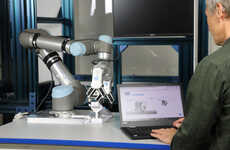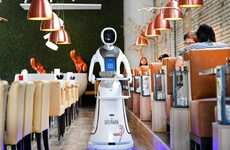
Robots Can Teach Other Robots How to Complete Tasks with the Robot Internet
Michael Baxter — January 25, 2014 — Tech
References: roboearth.org & fastcoexist
It's almost time to start panicking about the robot apocalypse because with the robot Internet here, robots are now a step closer to taking over the world. That may be a little bit of a hyperbolic statement, but robots can now officially learn from each other so the possibility is definitely there.
Initially, robots were programmed to complete tasks and that's what they did, but RoboEarth has taken it upon themselves to show that robots are more powerful than we initially believed with the Robot Internet.
In an experiment at a hospital, a patient asked an armless robot for a drink. The robot scanned the room, contacted RoboEarth and another robot that was more suited or the job came in and completed it. What this means for technology and humanity is definitely unclear, but it is truly astonishing.
Initially, robots were programmed to complete tasks and that's what they did, but RoboEarth has taken it upon themselves to show that robots are more powerful than we initially believed with the Robot Internet.
In an experiment at a hospital, a patient asked an armless robot for a drink. The robot scanned the room, contacted RoboEarth and another robot that was more suited or the job came in and completed it. What this means for technology and humanity is definitely unclear, but it is truly astonishing.
Trend Themes
1. Robot Internet - The robot Internet enables robots to learn from each other, potentially leading to more efficient and capable machines.
2. Robot Collaboration - Robots can now collaborate and assist each other in completing tasks, showcasing the potential for increased productivity and automation.
3. Human-robot Interaction - The experiment highlights the evolving dynamics of human-robot interaction, presenting opportunities for improved assistance and support in various industries.
Industry Implications
1. Healthcare - The use of self-teaching robots in hospitals can enhance patient care and streamline operations, leading to improved efficiency and better outcomes.
2. Manufacturing - Self-teaching robots that can teach and learn from each other have the potential to revolutionize the manufacturing industry, enabling flexible and adaptive automation.
3. Technology - The development of the robot Internet opens up new possibilities for technological advancements and disruptive innovations, reshaping the future of various sectors.
2.7
Score
Popularity
Activity
Freshness























